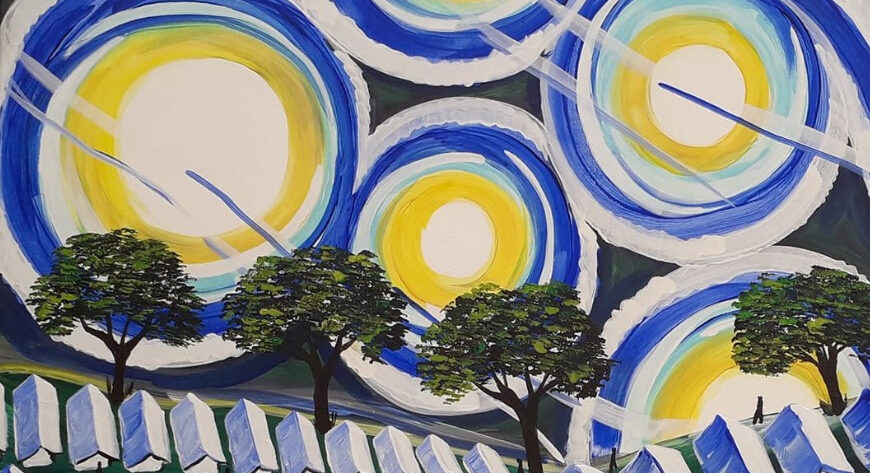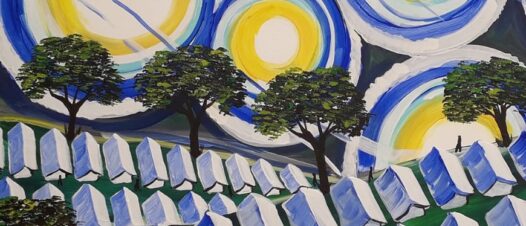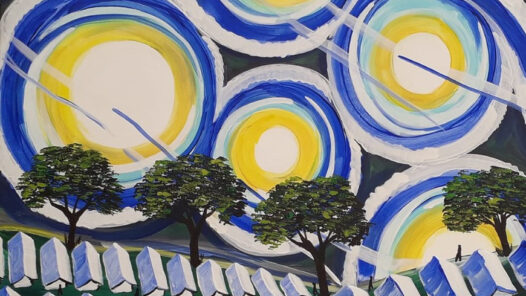Every time I go home to visit my parents my eyes always wander to the family photos consisting of graduation ceremonies, communions, confirmations, and school photos. One photo in particular always stand out to me. It is a baby picture of me in a refugee camp in Tanzania. In that picture I am around two years old.
The picture is placed in the middle of our mantelpiece. In that photo I am oblivious to the enormity of the situation of being born in a refugee camp. Something that I don’t think I will ever truly grasp. When I look at this picture a million emotions jump at me all at once. Mixed feelings of discomfort, sadness, and an overwhelming sense of pride. The photo acts as something that always keep me grounded as it always reminds me of how far I have come. Whenever I feel lost in life, I always return to this baby picture as it always gives me a sense of clarity and purpose.
I am at a point in my life where I look at this picture and feel happy, but this hasn’t always been the case. There are distinctive moments in my life where I have been reminded of my past upbringing. I remember when I was around 10 years old and moved to Ireland and my classmates started to innocently ask me about my childhood. In particular they would ask about bedtime stories, favourite Disney films and family holidays that were part of my childhood. I would tell them about my upbringing in the refugee camp without understanding the enormity of the situation. I thought this was the norm as my parents at this point had never sat me down and fully explained what it truly meant to be a refugee. I quickly noticed that the moment I uttered the word ‘refugee’ my classmates were somewhat familiar with the phrase as it was a constant stereotype projected onto people from Africa.
They equated refugee with Africa. Something that they had learned from their parents and school. Their shocked faces indicated that my childhood was not normal. Immediately once they knew they would treat me differently as I could tell they felt very sorry for me. A feeling that I am still uncomfortable with. It is something that I had never fully thought about until those interactions. I remembered at this young age asking my parents about my past. Especially trying to understand everyone’s pitiful reaction to my upbringing. They tried to explain as much as they could but we didn’t have a proper conversation about it until I was in my early twenties. Of course at that age they could not go into the ins and out of the politics of Rwanda and why I was born in a refugee camp.
All I remember was feeling overwhelmed with the idea that I didn’t have a ‘normal’ childhood and that I was born as a displaced person. The feeling of displacement is a feeling that I still struggle with. When I look at that picture my mind wanders to what life would have been like in the refugee camp. I have read books and watched films about the lived realities of life in a refugee camp. Yet, every time I try imagine what life would have been like growing up in in a refugee camp my mind completely goes blank. It’s as if my mind is protecting me and trying to retain my innocence. When I ask my parents about life in Tanzania, they just describe how I was a happy kid, unbothered by the chaos that was happening around me. I think about how I took my first step in that small tent.
It makes me think about all the times I would have wandered around the refugee camp in and out of other people’s tent not knowing any better. My parents tell me how they would stay up wondering if the confine of the tent is all that I would ever know. My mum painfully recalls watching me crawl around the small confines of our small tent unbothered of its size. She found her attention wandering to a million possibilities of how her and my dad would provide a future for me. Would my future be bright or was all that I was going to know is suffering ? They did their best to shield me from any trauma and created a safe space for me. Something that I am forever grateful for.
The story of my upbringing contributes so much to my feeling of liminality when it comes to the idea of belonging. I struggled with the idea of identity as I moved around a lot when I was younger so it was hard to truly feel like I belonged. When I was younger, and someone would ask me ‘Where are you from ?’ I would panic and innocently list out: Tanzania, Rwanda, Kenya, and Carlow.
I would associate my identity with all the places that I have lived without fully understanding the complexity and nuances of nationality and citizenship. The older I got that picture acted as a tool that would taunt me and remind me of how I belonged in an in-between space. The in-between space was a place where I didn’t feel Rwandese and where I was trying to construct me new Irish identity.
I would feel Irish in school then come home and be confronted with the picture that would remind me about my past. I didn’t understand that it was possible to have a dual identity. I was trying to construct my new Irish identity that I hoped would pave way me for me to have a better sense of belonging. I had hoped that the moment I received my Irish passport which is the first and only passport I have ever had would mean that I was able to look at that baby picture and not be reminded that I don’t belong. Instead, when I received the passport, I felt more confused about my identity. I had yet grasped the idea of existing and having a dual identity.
It wasn’t until 2020 when I started working on creative projects concerning identity and the fluidity of Irishness did I start to feel like I belonged. The in-between was a space that I now confidently occupied and took up space. Now when I returned home and my eyes would wander to the baby picture I no longer felt a mixture of emotions.
Instead, I felt one strong emotion. I solely felt pride. I was proud of how far I have come. I am amazed that young baby in the picture has accomplished things beyond anyone wildest dreams. I have accomplished things that I never knew were accessible to someone like me.
Every time I look at the picture, I am no longer ashamed of my past. I understand how all these moments shaped the person that I am today.
My past has helped my quest in humanising the ‘Other’ and creative outlets where voices on the fringe of society feel seen and heard.



